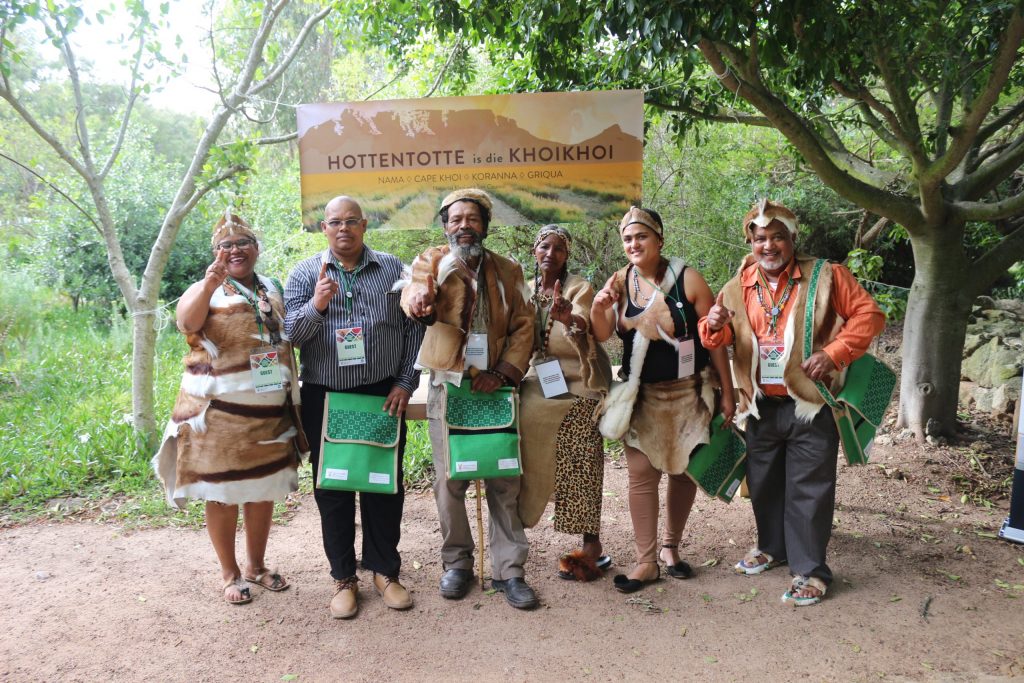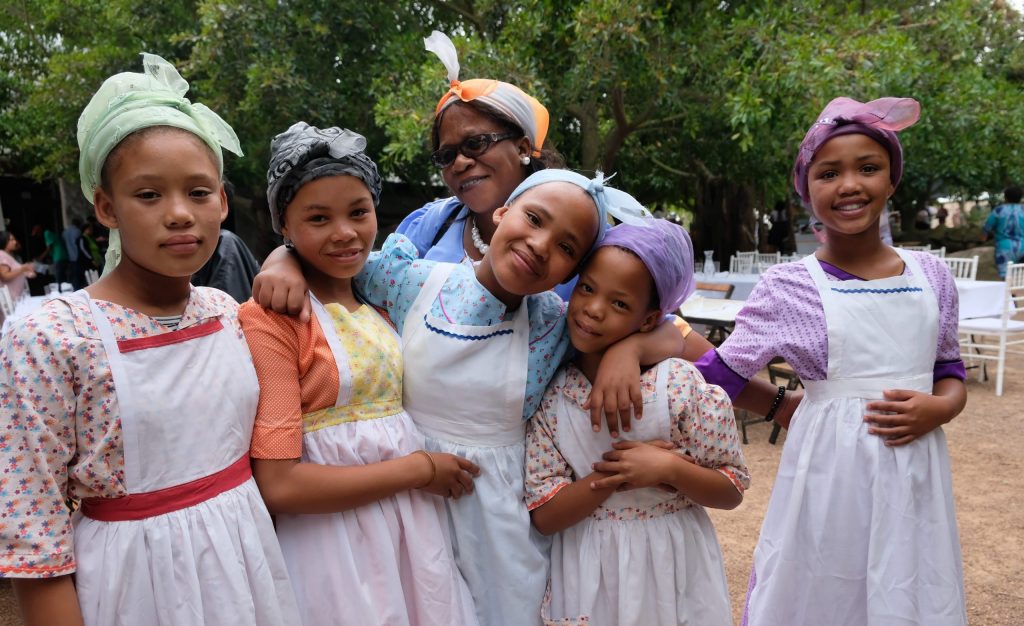“Our dignity is being restored in the land of our forefathers by recognising our Khoikhoi ancient traditional knowledge on rooibos. Our people are happy and our land healed.”
— Stanley Peterson, National Khoi & San Council
On 1 November 2019, following nine years of negotiations, the world’s first industry-wide benefit-sharing agreement was launched in South Africa between the Khoikhoi and San, and the South African rooibos industry. As representatives of the National Khoi & San Council, who represented the interests of some thirty indigenous communities, Natural Justice provided legal support throughout the process.
The agreement recognises the Khoikhoi and San peoples as the traditional knowledge holders to the uses of Rooibos, an indigenous plant species found only in the Cederberg region of South Africa. The agreement is the basis from which the Khoikhoi and San communities of South Africa will have access to benefits as a percentage contribution from the commercialisation of Rooibos by the South African rooibos industry.
The negotiations began in 2010 when the South African San Council wrote to the Minister of the then Department of Environmental Affairs (now, Department of Environment, Forestry and Fisheries) requesting negotiations with the rooibos industry in accordance with the South Africa’s legislative requirements: The National Environmental Management (Biodiversity) Act of 2004.
In 2012, the National Khoi & San Council joined the South African San Council in seeking recognition as shared traditional knowledge rights holders. The two Councils met with the South African Rooibos Council for the first time that year in order to start the process of negotiating an Access and Benefit-sharing agreement for Rooibos, facilitated by the Department of Environmental Affairs and supported by the late Minister Edna Molewa.
After a thorough process of negotiations, an agreement was finally concluded on 25 May 2019.
The legal basis for the Agreement
The negotiations of Access and Benefit-sharing (ABS) agreements originate from Nagoya Protocol, an international supplementary agreement to the UN Convention on Biological Diversity (CBD). Set out in Article 1, one of the fundamental objectives of ABS is the fair and equitable sharing of the benefits arising out of the utilisation of indigenous biological resources. The Nagoya Protocol on ABS was adopted on 29 October 2010 in Nagoya, Japan and entered into force on 12 October 2014, 90 days after the deposit of the fiftieth instrument of ratification. A central feature of this agreement, incorporates prior, informed consent for access to resources and traditional knowledge.
In South Africa, the National Environmental Management: Biodiversity Act 10 of 2004 and the Bioprospecting, Access and Benefit Sharing Regulation of 2008 were enacted in order to provide a regulatory framework for ABS. The South African legislative framework goes beyond Nagoya Protocol’s standard of regulating “genetic components” of resources to regulating the utilisation of the whole of the indigenous biological resource. This policy approach has been crucial for the San and Khoikhoi with regards to Rooibos and social justice.
Traditional Knowledge and the Khoikhoi and San Research shows that communities in areas where Rooibos is grown associate the knowledge of the uses of Rooibos with the African indigenous communities of the Khoikhoi and the San. In 2014, the Department of Environmental Affairs commissioned a study on the traditional knowledge associated with Rooibos and Honeybush (Cyclopia spp.). It concluded that the traditional knowledge associated with Rooibos lies with the San and Khoikhoi. See link below.

The National Khoi & San Council
The National Khoi & San Council, represented by Natural Justice, negotiated on behalf of thirty Khoikhoi and San communities from South Africa, and three Cederberg farming communities of Wupperthal, Niewouldtville and Suid Bokkeveld, who are indigenous primary producers of Rooibos. The National Khoi & San Council was established in 1999 by South Africa’s former President Nelson Mandela. It is currently a national, non-statutory body, set up to negotiate the constitutional recognition of the Khoikhoi and San peoples of South Africa, and recognised by government as legitimately representing the interests of the Khoikhoi and San. The National Khoi & San Council represents the following groupings: The San, Griqua, Nama, Cape Khoi and the Koranna.
The Access and Benefit-sharing Agreement
The ABS agreement launched between the parties now brings the South African Rooibos Industry into compliance with their benefit-sharing obligations as per South Africa’s bioprospecting law and regulations. Benefits will be calculated as a percentage of the farm gate price – which is the price that Processors pay to commercial farmers when buying Rooibos. A small levy of the benefits generated will then be paid to the Khoikhoi and San communities of South Africa through the vehicle of two community trusts as detailed below.
Rooibos Biocultural Community Protocol
The Khoikhoi Peoples’ Rooibos Biocultural Community Protocol is a supplementary policy document to the Rooibos industry-wide Benefit Sharing Agreement articulating the Khoikhoi indigenous communities (inclusive of Cederberg farming communities) living customary laws around consent in line with South Africa’s ABS regulations. The BCP provides further historical and legal context for the agreement and the process leading up thereto, setting out the rights of the Khoisan as indigenous people in South Africa, as well as their claims to the traditional knowledge of rooibos. It articulates what is expected of researchers, academics, industry and any person wanting to engage their traditional knowledge and the issues related thereto.
BCPs are recognised in South African and international law and are a legal document used to support access and benefit-sharing, as well as to promote the rights of communities. The Rooibos BCP has the objective of articulating who the Khoisan communities are as non-recognised African indigenous communities in South Africa. It serves as one of the first indigenous policy articulating how the Khoikhoi and Cederberg indigenous farming communities are governing themselves around their key customary resource’s knowledge.
You can access the publication here (English and Afrikaans)

More information
- The Khoikhoi Peoples’ Rooibos Biocultural Community Protocol (NATURAL JUSTICE PUBLICATION)
- Report of the Special Rapporteur on the situation of human rights and fundamental freedoms of indigenous people, Rodolfo Stavenhagen MISSION TO SOUTH AFRICA (UN REPORT 2006)
- South African Human Rights Commission Report, National Hearing Relating to the Human Rights Situation of the Khoi-San in South Africa (SAHRC REPORT)
- Traditional Knowledge Associated with Rooibos and honeybush Species in South Africa (REPORT: GOVERNMENT OF SOUTH AFRICA)
- Environmental Affairs on study of rooibos and honeybush species in South Africa (MEDIA STATEMENT: GOVERNMENT OF SOUTH AFRICA)
- Rooibos Robbery – A Story of Bioprospecting in South Africa (VIDEO)
- Rooibos Robbery: Nestlé accused of biopirating South African genetic resources (NEWS ITEM)
- Rooibos Restitution (VIDEO)
- Factsheet: San, Khoi & Rooibos Factsheet (FACTSHEET)
- Community Protocols in Africa: Lessons learned for ABS implementation (NATURAL JUSTICE REPORT)
We wish to thank the National Khoi & San Council and the following funders for walking the journey with us: The Deutsche Gesellschaft für Internationale Zusammenarbeit (GIZ) through the ABS Initiative (ABSI), the Heinrich Böll Foundation (HBF), and the Open Society Initiative for Southern Africa (OSISA). Your roles enabled a possibility never imagined in South Africa, or even the world. Natural Justice is deeply grateful that you believed in us and in this important case.
